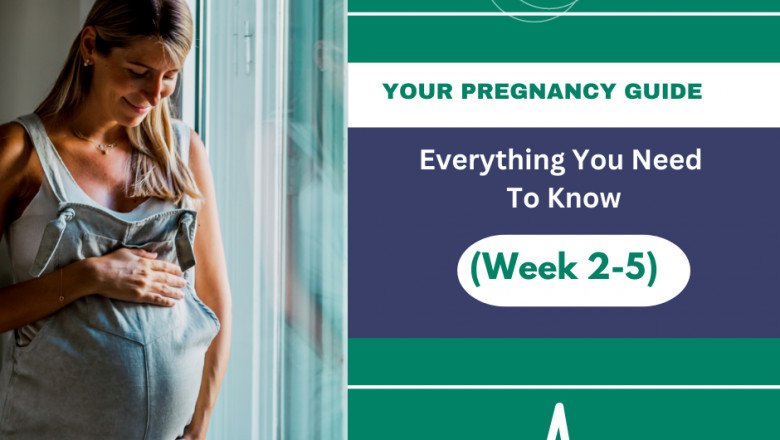
views
Your Pregnancy Guide: Everything You Need to Know (Week 2-5)
Even though you're in the very early stages of pregnancy, you may already have certain symptoms this week. For example, pregnancy increases the blood supply to your breasts, so you may experience a prickling or tingling sensation in them. Your nipples may be particularly sensitive.
Another early sign that you're expecting is a change of color in your vulva. Pregnancy will make your vulva and vagina darker. This is also caused by increased blood flow.
You may also notice that the amount of vaginal discharge that you have increases. This discharge is usually harmless, and won't look that different from the discharge you had before pregnancy.
Some light bleeding or spotting is common at two weeks pregnant. If you've noticed any pink or brown-coloured stains in your knickers, or light cramping when you go to the toilet, it's probably an implantation bleed. This happens as your fertilized egg buries into the lining of your womb.
If you think you've spotted the first signs of pregnancy, you'll be eager to take a pregnancy test. Some tests are designed to be very sensitive, and can detect pregnancy hormones as early as six days after you've conceived. This could be as early as the end of this week.
However, the most reliable sign of pregnancy is a missed period. Pregnancy tests will be more accurate if you wait to take one after your period is due. So, it may be best if you wait a little longer before you take your first test.
Your fertilized egg is now a tiny ball of constantly multiplying cells called a blastocyst. It implants into the lining of your womb and continues to grow. Some cells will become your baby, while others will become the placenta or the amniotic sac.
The cells that are developing into a placenta have started to produce the pregnancy hormone hCG (human chorionic gonadotropin). This hormone tells your ovaries to boost production of estrogen and progesterone, which stop your womb (uterus) from shedding its lining. hCG is also the hormone that will turn your pregnancy test positive.
Meanwhile, amniotic fluid is beginning to form in the cavity that will become the amniotic sac. This fluid will cushion your baby in the weeks and months ahead.
You may get food cravings early on in your pregnancy or notice that your favorite foods and drinks are suddenly unappetising. Aversions to tea, coffee, alcohol, fried food and eggs are common among new mums-to-be. This can work to your advantage though, as you should not drink any alcohol at all during your pregnancy.
Pregnancy hormones may also be having an effect on you, so don't be surprised if you feel tired and weepy. During the day, you may feel exhausted and struggle to stay awake. This is because your body is preparing itself to support your baby.
You may feel pregnant, but it's unlikely you'll get a clear result from a pregnancy test at this stage. A sensitive test may show a faint line. But this can just leave you feeling confused, rather than satisfied or excited.
The clearest sign that you're pregnant is a missed period. Yours probably isn't due until the end of this week or even next week, depending on the length of your menstrual cycle.
Inside your body, amazing developments are taking place. The tiny ball of cells dividing in your womb (uterus) is now an embryo, and is about the size of a poppy seed.
The next 5 weeks are especially important to your baby’s growth, as the basic foundations of their organs and limbs begin to form. Your placenta is also in the early stages of development, and your baby is surrounded by an amniotic sac.
This week may be the first time you have an inkling of the changes going on inside your body. Some of the earliest signs of pregnancy include tender breasts or tingling nipples. You'll soon notice changes in your boobs, if you haven't already.
You may notice some light bleeding or spotting around now, or the time that you usually have your period. This is called breakthrough bleeding. This happens when the hormones that are responsible for your menstrual cycle trigger bleeding. It can happen more than once throughout your pregnancy, but is usually nothing to worry about.
If you didn't begin taking a daily folic acid supplement when you were trying to conceive, now's the time to start. Folic acid helps to protect your baby against neural tube defects, such as spina bifida. You should take a daily supplement containing 400 micrograms (mcg) of folic acid until you're 12 weeks pregnant.
You also need to take 10mcg of vitamin D every day, throughout your pregnancy and beyond. This will help your baby to grow strong teeth and bones. You can take vitamin D and folic acid as separate supplements, or as part of a pregnancy multivitamin. It's up to you.
If you have diabetes or your body mass index (BMI) is above 30, you should be taking a higher dose of folic acid. Your GP can prescribe this for you at your booking appointment.
Although you don’t look pregnant yet, inside your womb, your baby is developing rapidly. The embryo has changed from a disc shape to look more like a tadpole. Their heart is one of the first organs to form and start working. It will start to beat around now.
The neural tube, which connects your baby's spinal cord to their brain, has formed and begins to close at each end. Other organs and tissues are also in the early stages of development.
See what your baby looks like now, and read more about their development at five weeks.
It's still early days, so you may not feel pregnant at all yet. This is perfectly normal. Some pregnancy symptoms, such as morning sickness, won't kick in for another week or so.
On the other hand, you may already have started noticing some tell-tale signs that you’re expecting. Your body is working hard to grow a new life so it's understandable if you're overwhelmed by tiredness at this stage. If all you're able to do is collapse onto the sofa at the end of the day, you're not alone.
The urge to wee more often is another sign that pregnancy hormones are surging through your body. You may get more headaches in the first trimester too. If this is the case for you, there are certain over-the-counter medicines you can take, and plenty of natural remedies that may help.
Try to get into the habit of eating well. It'll help to keep your energy levels up, and your baby will benefit if your meals include a variety of nutrients. Small, regular meals and frequent drinks can also prevent you from getting indigestion, a common side effect of pregnancy.
You'll need plenty of vitamin C every day to help your baby grow and develop. Good sources of vitamin C include oranges, red or green peppers, strawberries, blackcurrants and potatoes. And don't forget to take your daily supplements of folic acid and vitamin D.












Comments
0 comment